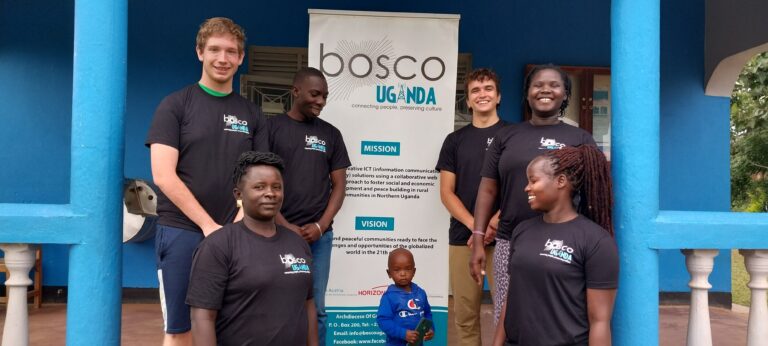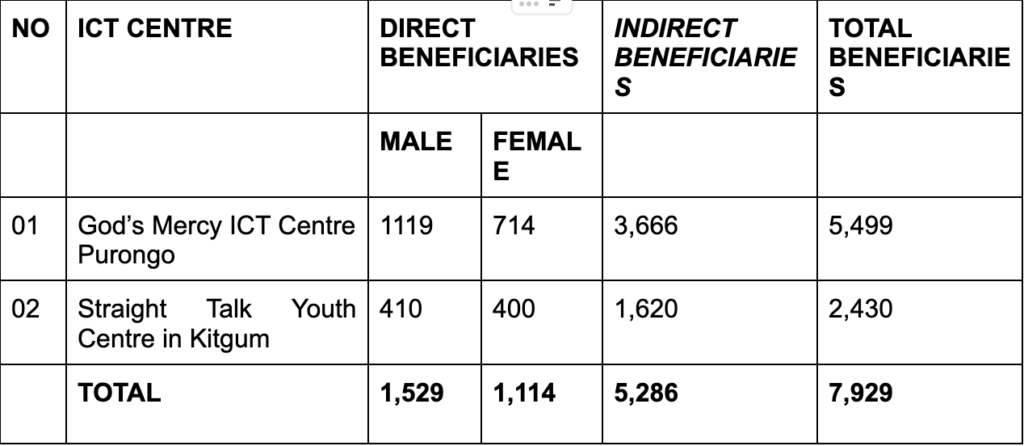Phase III of upgrading and extending the BOSCO Uganda Network
BOSCO continues to upgrade and extend their community network in Northern Uganda.

Project status: Closed
Country: Uganda
Partner: Battery Operated System for Community Outreach (BOSCO)
Impact goal: 4880 community members
About the project
The project aims to upgrade and extend the BOSCO Uganda Network Phase III in the Acholi Sub-Region of Northern Uganda. The project addresses the issue of limited internet access and high costs in Uganda, particularly in rural areas. BOSCO-U plans to upgrade community ICT access points, connect them to the internet, and provide capacity building in rural communities using solar power.
Results
The upgrade needs were identified through the review of the assessment reports for God’s Mercy ICT Centre in Nwoya district, and Straight Talk Youth Centre in Kitgum district respectively.
Two Memorandum of Understanding (MoU) with clear roles and obligations of parties involved were signed amongst the Community, local government leaders, and BOSCO Uganda as a definite willingness to embrace the project and they pledged to integrate the project into their local budgetary plans. Before the signing of the MoU, the parties were well-sensitized in a project inception meeting about the project, the funder, and the expected outcomes.
Two site management Committees (SMCs) were formed from each group, and 12 members were democratically elected considering aspects of inclusivity and diversity from each of the 2 ICT centers by the community. To enhance the smooth running of the ICT Centers, the capacity of the SMCs was built in leadership and management of the ICT Centers. The key topics of discussion included leadership, evaluation of the past ICT center, site management committee composition, risk management, conflict management, documentation and record keeping, monitoring and evaluation and sustainability requirements for the ICT Centers. As a result of this training, the SMCs at each of the ICT Centers developed rules and regulations governing the safety of the ICT Center, mobilized the community to participate in ICT learning, provision of security for all the equipment installed, volunteered their time, developed a sustainability plan for the center and handled the dynamics of the ICT Center including a monthly report to BOSCO Uganda.
Technical Installation and upgrade of the ICT Centers was done. This included the procurement and installation of 5 new laptops of higher specification as compared to the existing ones, a printer, 2 solar batteries of 200AH each, a charge controller, inverter and internet connectivity at both ICT Centers.
After the upgrade, we conducted digital literacy or computer training at the two centers. Even if these two centers were being upgraded, new trainers needed to be trained. Most of the formerly trained members or leaders at the centers got jobs or relocated therefore there was a need to train the new management team on how to use the computers and also become trainers of other trainees within the communities. 12 people were trained per center by the BOSCO Uganda team on computer literacy as Trainers of trainees (ToTs).
The topics included an introduction to computers, keyboard usage, Microsoft Office Word, Excel, PowerPoint and publisher, an introduction to the internet, online information gathering, social media marketing, and Kolibri which contains educational content and basic digital security tips. The training was conducted mainly in the local language (Acholi) to make everyone understand. The ToTs are now practising their knowledge and skills by training other members in their communities
The last training conducted was on basic maintenance of computers, solar systems and networks. This training is meant to build the capacity of the Site management committees to handle basic issues, problems or breakdowns that may arise at the centre with remote support from the BOSCO Uganda team. Instead of the BOSCO Uganda team having to travel to the ICT centers in case of a breakdown, the trained team on the ground will be able to support when directed remotely by BOSCO Uganda. Some of the trained members are now extending their skills to different households within their communities. For example, when households buy small solar systems, the people trained by BOSCO Uganda on solar installation and maintenance are contacted to install these solar systems at household levels. We have also witnessed some people starting their businesses in computer repairs and maintenance out of the knowledge and skills acquired through this training.
Finally, some board members and senior management of BOSCO Uganda Ltd conducted monitoring and evaluation visits to the project sites. The monitoring team noted that the project was implemented as planned and the beneficiaries gained the impacts of the project as planned. However, during the monitoring, when the beneficiaries didn’t perform as expected, they were guided accordingly.
The table below shows the number of direct beneficiaries from the project. The direct beneficiaries include the people trained by BOSCO Uganda on leadership and management, digital literacy and basic maintenance as Trainers of Trainees (ToTs), people trained by the ToTs at the ICT centers, daily users at the centre as well as the internet subscribers. The daily users access the ICT Centers for different purposes like accessing educational content through Kolibri, research, marketing their products and connecting with potential buyers on the internet, computer training, printing, photocopying, scanning, and typing among others are the services provided directly at each of the ICT centers.

The communities now have access to affordable internet, electrical devices like computers, Kolibri Education Content helping those in school and out of school, electricity for lighting and charging phones and laptops, site management committees have been trained and built their capacity in ICT and Leadership skills. The trained SMCs now know their roles, and obligations for the smooth running of the ICT centers.
We've written a blog about the importance of the community network and why BOSCO is dedicating their time to building it. You can read the blog here!
About the partner
Battery Operated System for Community Outreach (BOSCO) is an NPO in northern Uganda. The organization was formed in 2007 as an intervention to end the isolation of people in the Internally Displaced People’s camps of northern Uganda. The organization realizes its vision of ‘open and peaceful rural communities ready to face the challenges and opportunities of the globalized world in the 21st Century’ by providing innovative ICT solutions that foster socio-economic development and peace-building in the rural communities of northern Uganda.
Visit their website here to learn more about them.